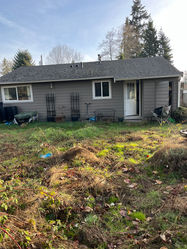
AUCTION HOMES
Foreclosure Overview
1 / Foreclosure Process
When a homeowner fails to make mortgage payments, the lender initiates foreclosure proceedings. This involves filing a legal notice of foreclosure, which varies depending on the jurisdiction. The process typically involves notifying the borrower, publishing public notices, and going through a legal process to determine the outstanding debt and the right to sell the property.
2 / Auction Preparation
Prior to the auction, potential buyers have the opportunity to research the properties scheduled for sale. They drive by the properties, review any available documentation, and perform due diligence to assess the property's condition, market value, and potential risks or liens associated with it.
Please note: Under no circumstances should you disturb the current tenant / homeowner while doing your due diligence. Homes sold at auction are often purchases site unseen.
3 / Auction Day
On the designated auction day, interested buyers gather at the auction location. The auction may take place at a courthouse, a public venue, or online, depending on the jurisdiction and the specific circumstances.
Typically, a representative from the lender, often a sheriff or an auctioneer, oversees the proceedings.
4 / Bidding Process
The auctioneer begins by describing the property and any terms or conditions specific to the sale. Bidders then compete against each other by making bids. The bidding can start at a specified minimum amount, known as the upset price or reserve price, or it can be open to any bid.
In Washington State I highly recommend knowing the last name of the person foreclosing on the property. Often times this is the first point of reference for a house being auctioned.
5 / Highest Bidder and Sale Confirmation
The property is awarded to the highest bidder, subject to any applicable rules and regulations. In some cases, the winning bidder is required to provide a deposit immediately after the auction, usually a percentage of the bid amount. The remaining balance is typically due within a specific timeframe, often within 30 days.
6 / Redemption Period and Title Transfer
Depending on the jurisdiction, the previous owner may have a redemption period during which they can reclaim the property by paying off the outstanding debt. If the redemption period expires without action or if the previous owner fails to redeem the property, the winning bidder becomes the legal owner. The necessary paperwork and transfer of title are then completed, usually through a deed recorded with the appropriate government agency.
It's important to note that foreclosure auctions come with risks and challenges. Properties sold at auctions are sold "as is," meaning buyers may not have the opportunity to inspect the property thoroughly or negotiate repairs. Additionally, there may be existing liens, back taxes, or other encumbrances on the property that buyers should be aware of before participating in the auction.
It's advisable to consult with a real estate attorney or a knowledgeable professional who can provide guidance and assistance throughout the auction process to ensure a successful and informed purchase.







